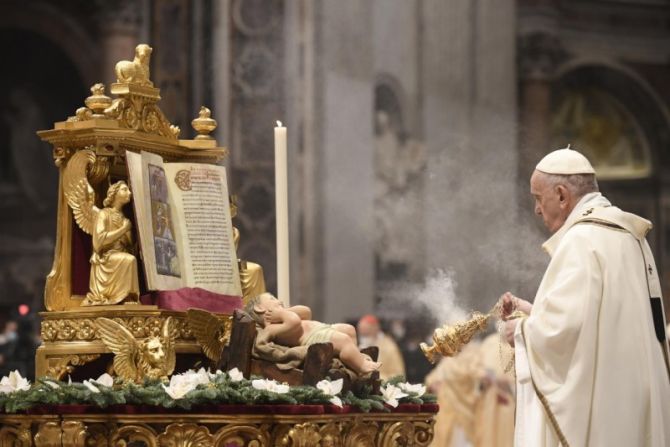On the Solemnity of the Epiphany, Pope Francis encouraged people to spend time in the presence of Christ in adoration, like the Magi.
“Let us never forget this: the journey of faith finds renewed strength and fulfillment only when it is made in the presence of God,” Pope Francis said in St. Peter’s Basilica on January 6.
“For this reason, let us not forget adoration, the prayer of adoration, which is not so common among us: to adore, in silence … There, like the Magi, we will have the certitude that even in the darkest nights a star continues to shine,” the pope said in his homily.
The Solemnity of the Epiphany celebrates the arrival of the Magi — also known as the Three Wise Men or Three Kings — who came with gifts to worship the Child Jesus shortly after his birth.
In his live-streamed homily, Pope Francis said that the feast of the Epiphany is a moment to ask: “Where are we on our journey of faith?”
“Have we been stuck all too long, nestled inside a conventional, external, and formal religiosity that no longer warms our hearts and changes our lives?” he asked.
“Do our words and our liturgies ignite in people’s hearts a desire to move towards God, or are they a ‘dead language’ that speaks only of itself and to itself?”
Pope Francis added that it is “sad when a community of believers loses its desire and is content with ‘maintenance’ rather than allowing itself to be startled by Jesus and by the explosive and unsettling joy of the Gospel.”
“It is sad when a priest has closed the door of desire, sad to fall into clerical functionalism, very sad.”
The pope attributed “the crisis of faith” in societies to “the eclipse of desire for God,” which he said is related to “a kind of slumbering of the spirit, to the habit of being content to live from day to day, without ever asking what God really wants from us.”
“We are sated with plenty of things, but fail to hunger for our absent desire for God … we find ourselves living in communities that crave everything, have everything, yet all too often feel nothing but emptiness in their hearts: closed communities of individuals, bishops, priests or consecrated men and women,” he said.
Pope Francis suggested that the way to increase desire for God is to place oneself in his presence.
He said that “Jesus alone heals our desires” from the “tyranny of needs” that make hearts grow sickly.
“God … elevates our desires; He purifies them and heals them of selfishness, opening them to love for him and for our brothers and sisters. … please let us not forget adoration,” the pope said.
Pope Francis added that the pilgrimage of the Magi is an example for all who are called to journey towards Jesus.
“The journey of life and faith demands a deep desire and inner zeal. Sometimes we live in a spirit of a ‘parking lot’; we stay parked, without the impulse of desire that carries us forward,” he said.
“The Magi teach us that we need to set out anew each day, in life as in faith, for faith is not a suit of armor that encases us; instead, it is a fascinating journey, a constant and restless movement, ever in search of God, always discerning our way forward,” the pope said.
Highlighting how the Magi defied Herod, Pope Francis said that the Magi are models of “a courageous faith” that is unafraid to challenge the sinister logic of power, “where in our day modern Herods continue to sow death and slaughter the poor and innocent, amid general indifference.”
“The Magi return ‘by another way.’ They challenge us to take new paths. Here we see the creativity of the Spirit who always brings out new things,” he said.
“That is also one of the tasks of the Synod we are currently undertaking: to journey together and to listen to one another, so that the Spirit can suggest to us new ways and paths to bring the Gospel to the hearts of those who are distant, indifferent or without hope, yet continue to seek what the Magi found: ‘a great joy.’ We must always move forward.”
